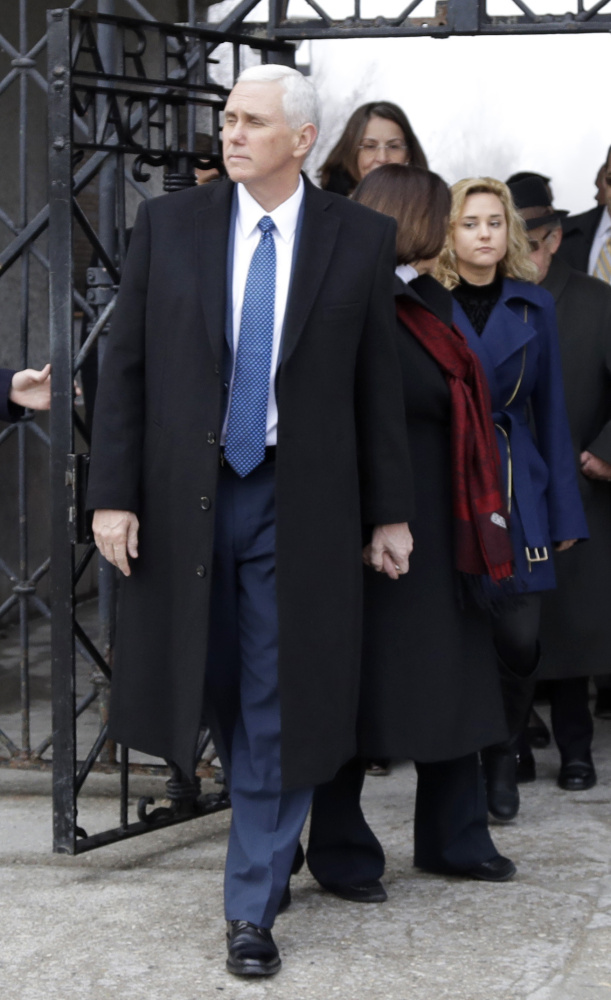BRUSSELS — Diplomats and leaders across Europe had one crucial – if unstated – question for Vice President Mike Pence when he visited Munich and Brussels this past weekend: Is he the shadow president, or a mere shadow of the president?
And if the mission of Pence’s trip abroad was clear – to reassure worried allies this weekend that, yes, despite what his boss may say, the United States remains committed to the security of Europe and to the historic trans-Atlantic partnership – Pence’s role was anything but.
Though the vice president repeatedly stressed he was speaking on behalf of President Trump, the two men indeed felt like they were separated by an ocean.
Pence offered bland mollifications, forced to calm and cajole European countries that, in the post-Cold War order, until recently never had cause to question the support of the United States. But in Florida on Saturday evening, Trump did the opposite, again criticizing NATO – just hours after Pence had extolled its virtues in Munich – and offending yet another ally, when he implied there was a recent terrorist attack in Sweden that seemed to exist only in his imagination.
A TRIP’S TIMING
The study in contrasts between Trump and his No. 2 was almost as stark as the timing and substance of Pence’s trip – a pacifying visit just four weeks into Trump’s young, if turbulent, presidency.
And so, like a loyal best man convincing a confused bride that the wedding must go on after a bachelor party gone awry, Pence journeyed to Europe to soothe a continent that has watched, with alarm, as Trump called NATO “obsolete” and rose to electoral victory on the promise of a more isolationist “America First” set of populist policies.
Even for the diplomats, bureaucrats and foreign leaders who found comfort in his words, Pence’s gentle message belied a more thorny question that hummed throughout the conference lobby: Will Pence emerge as a capable vice president, empowered by his willingness to delve into policy details where the president will not, or is he yet another grunt in Trump’s freewheeling army of disruption?
Pence’s inner-circle credibility took a dive last week, when news emerged that former national security Mike Flynn had misled the vice president about conversations he had had with the Russian ambassador to the United States – claims the vice president repeated on the Sunday shows. Though Trump ultimately demanded Flynn’s resignation, Pence was in the dark for two full weeks, and only learned he had been lied to from news reports.
But just like Republicans on Capitol Hill, who still view Pence as their most sturdy vehicle for traditional conservatism in the Oval Office, much of the world, too, is trying to discern if Pence truly speaks for the president, and if they can rely on a man whose best intentions may yet be undone by a tweet from his boss.
CARELESSLY STATED
Already, some of Trump’s senior team seems to be saying one thing while the president is pushing something altogether different.
The day after Trump, in a news conference with Israeli Prime Minister Benjamin Netanyahu, upended decades of U.S. foreign policy by saying he was open to a one-state solution to the Israeli and Palestinian peace process, Nikki R. Haley, his United Nations envoy, said the administration was, in fact, “absolutely” committed to a two-state solution. And at a NATO meeting in Brussels last week, Defense Secretary Jim Mattis seemed to contradict Trump’s claims that Russia had not tried meddle in the U.S. elections, and also reaffirmed the U.S.’s commitment to NATO.
On Saturday, Pence largely echoed Mattis’ message of support for NATO. And on Monday, in Brussels, he will meet with senior Europe Union leaders before returning to Washington.
In many ways, like the voters in the United States who took Trump seriously but not literally, some allies are now taking Pence hopefully – because he may be, they believe, their best hope at maintaining the existing world order.
“I put my trust in them, so I am definitely reassured,” said Estonian President Kersti Kaljulaid, who met Pence Saturday with other Baltic leaders.
“He was very understanding, very friendly, and told us that if we ever have any problems we should call,” she said. “He said if you don’t want to call the president you can always call me.”
Other Baltic leaders echoed the sentiment. But they share a border with Russia and have little choice but to cross their fingers and hope the status quo will hold.
Send questions/comments to the editors.



Success. Please wait for the page to reload. If the page does not reload within 5 seconds, please refresh the page.
Enter your email and password to access comments.
Hi, to comment on stories you must . This profile is in addition to your subscription and website login.
Already have a commenting profile? .
Invalid username/password.
Please check your email to confirm and complete your registration.
Only subscribers are eligible to post comments. Please subscribe or login first for digital access. Here’s why.
Use the form below to reset your password. When you've submitted your account email, we will send an email with a reset code.